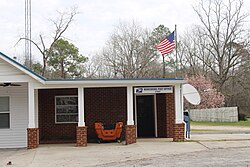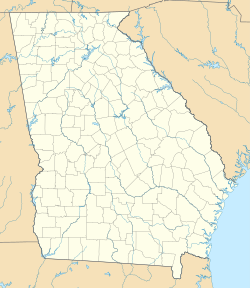Waresboro is an unincorporated community and census-designated place (CDP) in Ware County, Georgia, United States, located west of Waycross. The community is part of the Waycross micropolitan statistical area.
Waresboro | |
|---|---|
 Waresboro post office | |
| Coordinates: 31°14′56.4″N 82°28′27.84″W / 31.249000°N 82.4744000°W | |
| Country | United States |
| State | Georgia |
| County | Ware |
| Population (2020) | |
| • Total | 375 |
| Time zone | UTC-5 (Eastern (EST)) |
| • Summer (DST) | UTC-4 (EDT) |
| ZIP code | 31503[1] |
| Area code | 912 |
The 2020 census listed a population of 375.[2]
History
editIn 1824, Waresboro was the first county seat of Ware County. In 1860, newspaperman and lawyer Carey Wentworth Styles practiced law in Waresboro, after moving to the community from Brunswick where he had been mayor. While in Waresboro, Styles published the Georgia Forester, a weekly newspaper. In 1861, Styles was elected as a delegate from Ware County to the Georgia Secession Convention where, along with the other delegate from Ware, Col. William Angus McDonald, Styles voted to secede.[3] Styles left Waresboro at the beginning of the Civil War, when he enlisted in the Confederate Army. After the war, he moved to Atlanta, where he founded The Atlanta Constitution.[4]
A railroad junction located some miles away from Waresboro grew into the city of Waycross, which eventually became the hub of commerce in Ware County. In 1873, Waycross replaced Waresboro as the county seat, sending the Waresboro area into a slow decline.
The community of Waresboro was granted a city charter by act of the Georgia General Assembly on December 9, 1893.[5] As the neighboring city of Waycross grew, the fortunes of Waresboro diminished. Eventually, the city reverted to an unincorporated community, which remains the current status.
According to the Waycross Journal Herald dated November 13, 1975, Louise Mock donated the oldest home in Ware County to the Okeefenokee Heritage Center. The house originally stood at the intersection of Church Street and Old Stagecoach Road, before being moved, in 1982, to the Heritage Center, where it underwent partial restoration. It was the home of General Thomas Hilliard, and is preserved as The Hillard House at the Heritage Center.[6] It is now on display, and contains furniture, implements, and tools of the period of original occupation.
Demographics
edit| Census | Pop. | Note | %± |
|---|---|---|---|
| 2020 | 375 | — | |
| U.S. Decennial Census[7] 2020[8] | |||
Waresboro was first listed as a census designated place in the 2020 U.S. Census.[8]
| Race / Ethnicity (NH = Non-Hispanic) | Pop 2020[8] | % 2020 |
|---|---|---|
| White alone (NH) | 327 | 87.20% |
| Black or African American alone (NH) | 20 | 5.33% |
| Native American or Alaska Native alone (NH) | 1 | 0.27% |
| Asian alone (NH) | 0 | 0.00% |
| Pacific Islander alone (NH) | 0 | 0.00% |
| Some Other Race alone (NH) | 1 | 0.27% |
| Mixed Race or Multi-Racial (NH) | 7 | 1.87% |
| Hispanic or Latino (any race) | 19 | 5.07% |
| Total | 375 | 100.00% |
In 2020, it had a population of 375.
References
edit- ^ "Waresboro GA ZIP Code". zipdatamaps.com. 2023. Retrieved February 17, 2023.
- ^ "Waresboro CDP, Georgia". United States Census Bureau. Retrieved April 7, 2022.
- ^ Jefferson Davis (12 March 2012). The Papers of Jefferson Davis: 1871-1879. LSU Press. pp. 37–38. ISBN 978-0-8071-3907-3.
- ^ Raymond B. Nixon (June 17, 1945). "Constitution's Founder Fought for Georgia with Pen and Sword". The Atlanta Constitution. Retrieved April 7, 2019.
- ^ Georgia (1893). Acts of the General Assembly of the State of Georgia. Clark & Hines, State Printers. pp. 335–345.
- ^ "Hilliard House". Okefenokee Heritage Center. Retrieved April 13, 2019.
- ^ "Decennial Census of Population and Housing by Decades". US Census Bureau.
- ^ a b c "P2 Hispanic or Latino, and Not Hispanic or Latino by Race – 2020: DEC Redistricting Data (PL 94-171) – Waresboro CDP, Georgia". United States Census Bureau.

